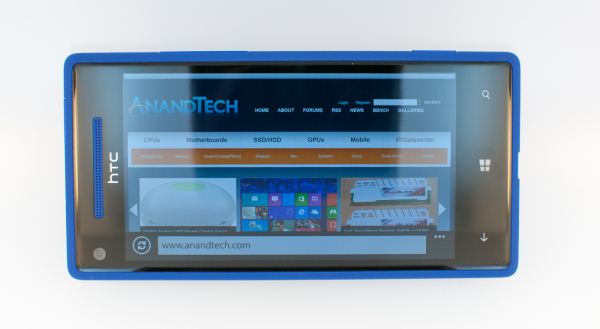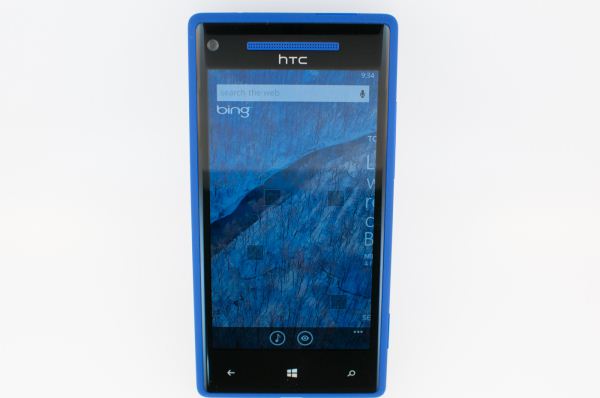Windows Phone 8 and Windows Phone 8X by HTC Preview
by Brian Klug on October 29, 2012 2:10 PM EST- Posted in
- Smartphones
- HTC
- Mobile
- windows phone 8
- Windows Phone 8X
- HTC 8X
- WP8
I titled this section final thoughts but left off the word conclusions because I feel that I need to spend longer with WP8 before really drawing any major conclusions - think of this as something of a big preview. At the same time, my first impressions and thoughts are indeed beginning to solidify. For the platform WP8 is absolutely an evolutionary step, rather than another dramatic re-imagining of Microsoft's vision for smartphones. Reimagining the start screen and including another size of live tiles is a nice touch, but the majority of the WP8 interface is the same as it was before. In fact, the most dramatic of changes with WP8 aren't even really visible to end users immediately with the move to the NT based kernel - the fruits of that move will only come later on in the future of the platform with increased hardware portability, better performance, and easier execution for OEMs and silicon vendors.
Anand made this great observation a while back that each platform was ultimately a reflection of the desktop position of the company behind it. For Google's smartphone platform, that means a full standalone computing environment complete with filesystem, since the search giant lacks its own desktop OS. Android essentially has to compensate for that lack of a real desktop platform by being everything. For iOS, what started as a clear evolution of the iPod has slowly evolved into a standalone platform, but still separate and distinct from OS X. iOS on an iPad for example can exist without a desktop, but doesn't try to supplant one. For Windows Phone, I can't shake the feeling that Microsoft still views the smartphone story as an accessory to everything else - Xbox, Windows 8, and Windows RT. They're three very distinct strategies with subtle differences, but absolutely drive the software decisions that get made each update.
At the same time WP8 feels like a dramatic update over WP7.5, and I find myself wondering what position Windows Phone would be in had it launched with the NT kernel and with this overall platform. The reality is that WP7 was a time to market play and that at the same time Microsoft was busy porting all of the software to deliver a Windows RT, Windows 8, Windows Phone 8 trifecta. Now that it's upon us hopefully some of the real advantages of this triple play will finally be made clear, and to really be the judge of that I need to actually sit down with all three and experience it. From a feature perspective I just wish that WP8 had tweaked a few more things - fast app switching still is a view with JPEG-compressed screenshots and visible artifacts, there's no VPN support, and messaging needs support for more IM protocols to be truly useful. Application support has gotten better over time on Windows Phone, but now the big drive will be getting existing apps updated to support the new features like live tiles and faster app switching. The big question is how many Windows RT or Windows 8 apps developers will end up porting over to WP8, a process which should be relatively painless given the shared frameworks.
For what it is, WP8 is a great update. It brings us the framework necessary to finally get modern hardware for Windows Phone, and will launch with what is without a doubt the best hardware from OEM partners in the 8X and Lumia 920. My time with HTC's 8X has been extremely positive - I think they nailed the industrial design, in hand feel, and the right balance of features for a Windows Phone 8. The OS feels smoother than it ever has everywhere I look and in every app I've tried out.












95 Comments
View All Comments
beginner99 - Monday, October 29, 2012 - link
...and that basically kills the OS. I mean most of the stuff you do on the web relies on JS performance and on mediocre hardware (ARM) and a poor browser that doesn't work that well.karasaj - Monday, October 29, 2012 - link
How on earth is this mediocre hardware? You can't possibly be comparing WP to laptops. In that case, the A6 in the iPhone is terrible, and I can't figure out why we don't just have an ULV ivy bridge.It's the exact same hardware in high end Android devices, and very competitive with iP5. And the non SoC stuff is arguably even better than other phones.
There will also be different browsers available I imagine. Chances are something like firefox will be released on WP.
melgross - Tuesday, October 30, 2012 - link
The hardware in this is ok, but MIT doesn't seem great. Certainly not in performance. The iPhone beats it hands down.tipoo - Tuesday, October 30, 2012 - link
Hmm, it does look that way if you disregard Sunspider which is the outlier and probably the most optimized for, with such a fast SoC the phone only trades blows with the 4S.andrewaggb - Monday, October 29, 2012 - link
Two things bug me about this phone.Middle of pack battery life. That sucks. I hope another WP8 device has market leading/competitive battery life.
No SD slot and 16 gigs of storage. Personally I'd like a higher end option.
cmdrdredd - Monday, October 29, 2012 - link
Even Nexus devices have no SD card. They want you to stream from the cloud using Google Music (on android) or their Xbox Music app (on WP8) and use their drop box cloud storage.hrrmph - Monday, October 29, 2012 - link
I don't want to rely solely on streaming from the cloud. Data is precious and this ain't a game of roulette.I want reasonable quantities of onboard NAND and an mSD slot.
My Note 2 has 80GB total = 16GB onboard plus mSD 64GB.
Even my Zune has 80GB, albeit via a mechanical HDD.
My N900 has 64GB total = 32GB onboard plus mSD 32GB.
My X523 feature phone has 32GB via mSD.
Even so, 80GB of storage still seems too small. Especially if you are going to carry a good-sized collection of loss-less music and some videos, along with documents, etc.
----------
I would really like to replace my carry-everyday feature phone with a Windows Phone.
The HTC 8X is beautiful, but 2 things are missing now from all Windows Phones: The iPhone 5 has the best holdability and screen size, so a high-end 4" Windows Phone would be great. Also, Samsung Android devices provide mSD slots, which are crucial to expanding local storage.
---------------
As for what I've already got:
The N900 is weak on software, OS functionality, and ease of use. Windows Phone would fix that.
Unlike most users who are buying the Note 2 as a phone, I actually bought the Note 2 to use as a tablet. It's to replace my Kindle Fire. I found the Kindle Fire to be too limited on functionality, and it has no GPS or telephony radios.
The Note 2 is impractical to wear, but I got it for its incredible functionality and backpackability.
Windows Phone OEMs should target getting the functionality of the Note 2 squeezed into a 4" Windows Phone with dual-micro-SIMs, 64GB NAND onboard, and an mSDXC slot, so you can crank the storage up to 128GB or better.
-
Geraldo8022 - Monday, October 29, 2012 - link
I absolutely agree. I am not always where the cloud is available. This phone is yesterday. I thought MS would make the phone very usb friendly for external storage, DAC, etc.darwinosx - Tuesday, October 30, 2012 - link
No..Google knows that SD cards on Android sucks.Taft12 - Wednesday, October 31, 2012 - link
How does no-SD-card-on-Nexus help those of us who wanted an SD slot on this phone?